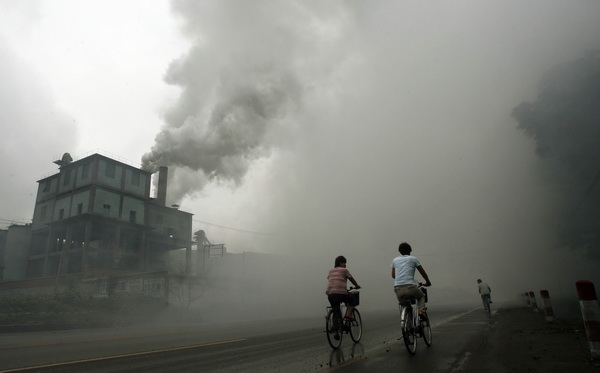


By Yu Huapeng (于华鹏)
Issue 627, July 8, 2013
News, page 5
Translated by Tian Shaohui
Original article: [Chinese]
This is an extended abstract of an article that appeared in this week's edition of The Economic Observer, for more highlights from the EO print edition, click here.
The Standing Committee of China's National People's Congress (NPC), the country's parliament, completed deliberations on the second draft of amendments to China's Environment Protection Law (环境保护法修正案(草案)) at the end of June. The changes included in the second draft represent a fundamental overhaul of the law with almost all aspects of the legislation being altered in some fashion.
Luo Jianhua (骆建华), the former deputy head of the NPC's Environment Protection and Resources Conservation Committee, told the EO that there were two main aspects to the overhaul, one of which is improving information transparency.
The EO has learned that following the second reading, the legislation will now directly enter the "third reading" stage and will not be opened up to public debate and comment again. Previously, an official from the Ministry of Environmental Protection told the EO that if the draft amendments passed the second reading stage, the "New Environmental Protection Law" could possibly be enacted before the end of this year.
Major Changes to the Law
Interdepartmental disputes have been ongoing since the decision to first amend the law was made in January, 2011. In September 2011, the Environment and Resource Protection Commission of the NPC completed the first draft of the amendments, with input from the Ministry of Environmental Protection and scholars. After several revisions were made, the draft amendment passed a first reading by the Standing Committee of the NPC in August 2012. Following a process of publc consultation, many significant changes have now been made to the draft.
"Last year, after the first draft of the amendments had been opened to public comment, members of the Legislative Affairs Commission and Law Committee of the NPC went to Shanxi and Shandong Province to conduct research. At the same time they also discussed the amendments with representatives from the State Council's Legislative Affairs Office and the Ministry of Environmental Protection," a person involved in the drafting of the law told the EO.
"On May 30, the Law Committee of the NPC held a meeting to discuss the need to make changes to the initial draft amendments, after that, on June 17, the Law Committee of the NPC held another meeting and the new draft that they settled on at that meeting was the version that was passed on to the Standing Committee of the NPC for a second reading."
According to what this individual told the EO, discussions about changes to the draft centered on a few key issues: the overall role of the law, the responsibilities of local governments, the sharing of environmental data, preventing pollution related to farming in rural areas, public participation, information transparency and punishment.
Nearly all of the members of the Legislative Affairs Commission and Law Committee of the NPC who worked on the second draft of the amendments agree that the law should be comprehensive and aim to solve a series of common problems. In order to make clear the position of the Environmental Protection Law in relation to other environmental regulations, a clause stating that "protecting the environment is a basic underlying policy of the state" (保护环境是国家的基本国策) was added to the second draft. The draft also mentioned a few guiding principles, such as, protection is the top priority (预防为主), public participation (公众参与) should be encouraged and polluters should shoulder responsibility for their actions (污染者担责的原则).
The same source also mentioned that during deliberations, committee members made a point of adding a clause that addresses pollution in rural areas, with a special emphasis on the monitoring of pollution levels, controlling the use of fertilizer and preventing heavy metals and other substances harming the environment.
Committee members also suggested strengthening punishments for polluters in order to deal with the current situation in which "the costs of breaking the law are low but the costs of obeying the law are high" (违法成本低、守法成本高).
Another change to the draft amendments is in relation to the role of local governments in enforcing environmental laws. In the past, many local governments pursued GDP growth at the expense of the environment. In this latest draft, it's clearly stipulated that "local governments at all levels should be responsible for the pollution and environmental problems in their own administrative regions." (地方各级人民政府应当对本行政区域的环境质量负责) Irresponsible local leaders who fail to enforce environmental laws may be marked down, demoted or even removed from their post.
The new draft also stated that local governments need to make sure that their environmental plans are in keeping with the central government's overall environmental plan.
A section outlining how environmental protection information should be made available to the public was also added to the amendments. The draft lists the kind of information that governments above county level are expected to provide, it includes environmental monitoring data, information about environmental emergencies and pollution charges.
In addition greater emphasis has also been placed on garnering popular opinion and encouraging public participation in the environmental evaluation process of major construction projects. These amendments have been added as a direct response to the frequent outbreaks of "mass incidents" (群体事件) or protests in recent years that are said to have been caused by a lack of "public supervision" over decision making and a failure to share information.
Wang Xi (王曦), an environmental law expert at Shanghai's Jiaotong University (上海交通大学), told the EO that "These newly-added clauses are vey detailed and important. The requirment that companies putting together an environmental impact assessment have to engage the public represents huge progress. Currently, because many projects don't let the public particpate in the early stages of planning, this causes "mass incidents" with very serious consequences. Most of these environmental mass incidents are caused by information being suppressed, if the public is allowed to particpate in the early stages of policy planning and able to monitor the process, we can completely avoid these kind of incidents."
The committee members who worked on the draft amendments also said that the list of agencies that were qualified to launch legal proceedings against polluters needed to be diversified. Currently the number of agencies that can launch legal action is limited and it also includes the All-China Environment Federation (中华环保联合会), which reportedly accepts financial support from polluting enterprises.
Other changes to the legislation include items aimed at addressing the recent bout of heavy air pollution that smothered areas of northern China in early 2013. The draft raises the issue of regulators in different jurisdictions to have the same rules and supervision and to cooperate with each other.
Wang Xi argues that aside from a few minor changes to the draft, the focus should now be on implementation and how the law will operate in practice.
"Even if we were to make the law even better, if we're not able to to implement it this would all be in vain. Now the most important thing to do is work out how to avoid local governments and the Ministry of Environmental Protection from turning a blind eye do some instances of environmental pollition and how to implement a system under which fines and punishments are carried out."
Links and Sources
Economic Observer Online: Changes made to Draft Amendments to Environmental Protection Law
Economic Observer Online: NPC to Consider Environmental Protection Law Amendment

